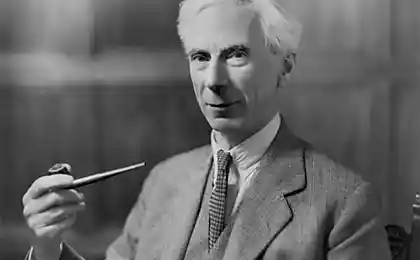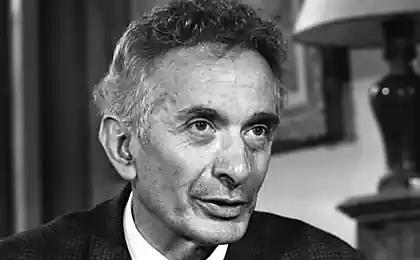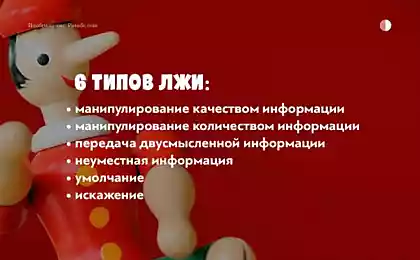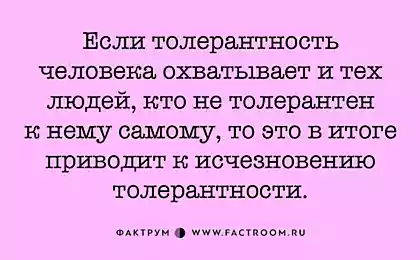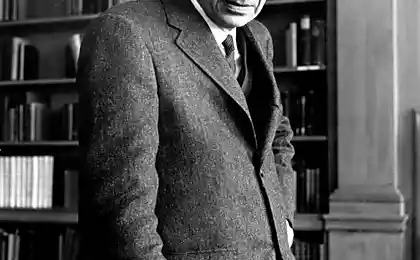561
"The paradox of the heap", or what do we do with uncertainty
Lecturer of logic at Oxford University, philosopher Timothy Williamson examines the classic "the paradox of the heap", along the way explaining what fuzzy logic is different from the traditional, like the problem of uncertainty manifests itself in our lives and why we cannot know everything.
Imagine a pile of sand. You carefully remove one grain of sand. The pile remained in place? The answer is obvious: Yes. Removing one grain of sand will cause the pile will cease to exist. The same principle will work when you remove another grain of sand, and then another... after removing every grain of sand, the heap will remain a heap in accordance with this principle. But the number of grains of sand in the pile is limited, so eventually your pile will consist of three grains of sand, then two grains of sand, then one and finally in a pile without any grains.
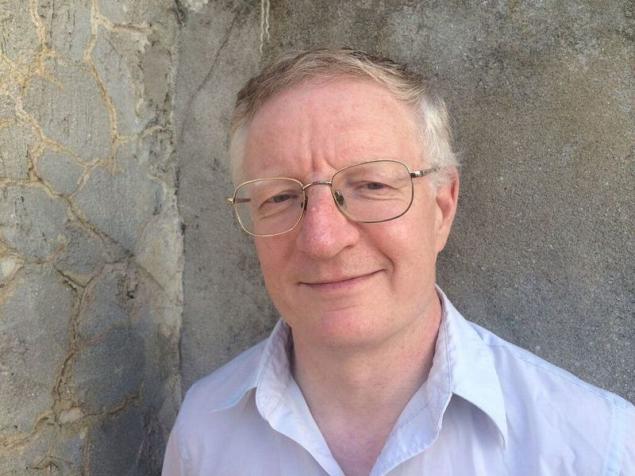
But this is ridiculous. Something must be wrong with this principle. At some point, removing one grain of sand causes the pile ceases to exist. But this also seems ridiculous. Like one grain of sand can cause this difference? This ancient puzzle is called "the paradox of the heap" (sorites paradox).
There would be no problem if we had clear, accurate definition of the word "heap". The trouble is that we have no such definition. The meaning of the word "heap" is vague. There is no clear difference between the United grains and grains do not form a unity. By and large it doesn't matter. We manage pretty well using the word "heap" on the basis of casual impressions. But if the local Council calls you to account for discharge of the sand pile in a public place, and you deny that it was a lot, and you are forced to pay a heavy fine, the outcome may depend on the meaning of the word "heap".
More important legal and ethical issues are also associated with uncertainty. For example, in the process of human development from conception to birth and adulthood, when personality appears? In the process of brain death when a person ceases to exist? These questions are important for the permissibility of medical interventions such as abortion and off life support. In order to talk about them properly, we need to know how to talk about such indefinite words as "person".
You can find aspects of uncertainty most words in English or any other language. Aloud or silently, we are talking mostly in vague terms. Such arguments can easily create paradoxes with uncertainty predicates, as in the paradox a lot. You can become poor by losing one cent? Is it possible to become high, becoming higher in one millimeter? First, these paradoxes seem trivial verbal tricks. But the more strictly philosophers studied them, the deeper and more complex they seemed. Such paradoxes raise doubts about basic logical principles.
Traditional logic is based on the assumption that every assertion is either true or false (but not both). This is called ambiguity (bivalente), and according to her there are only two truth values – true and false (truth and falsity).
Fuzzy logic — a powerful alternative approach to the logic of uncertainty, rejecting the ambiguity in favor of a continuum of degrees of truth and falsehood – with perfect truth at one end and absolute hypocrisy on the other. In the middle of a particular statement can be half true and half lie. From this point of view, as soon as you remove one grain of sand after another, the statement "there is a Lot of" step by step becoming less and less true. No steps takes you from the perfect truth to perfect lies.
Fuzzy logic rejects some of the basic principles of classical logic that standard mathematics. For example, traditional logic says at every stage, "Or there are a bunch, or it is not." This is an example of the General principle, which is called the excluded middle, or false dichotomy.
False dichotomy — an error in reasoning (for example, when making the decision), which consists in the omission opportunities other than the two under consideration.
Fuzzy logic says that the statement "there is a Bunch" is a half-truth. In this case, the statement "the lot is either there or it is not" — is only half true.
At first glance, the fuzzy logic can look natural and elegant solution to the problem of uncertainty. But when you are dealing with the consequences, this conclusion becomes less convincing. To understand why, imagine two piles of sand, exact duplicates of one another — one right, one left. Whenever you remove one grain of sand from one pile, you will also remove the same grain of sand from another. At each stage the grains of sand on the right and left lot give exact copies of each other. It is obvious that if there are a bunch on the right, you also have a bunch left, and Vice versa.
Now, in accordance with fuzzy logic, until we remove grains one by one, sooner or later we will reach the point where the statement "on the Right is a bunch of" will be a half true, half lie. As what is to the left, duplicate what is on the right, the statement "on the Left is a bunch of" also is half true, half lie. Thus, the fuzzy logic rules imply that the complex statement "There are a bunch on the right, but not the pile on the left" is also half true, half false, and this means that we equally must balance in order to agree to reject it.
But this is absurd. We have to completely reject the statement as "There are plenty of right and left no pile" suggests that there is a difference between what is right and what is left — but there is no such difference; it's grit-duplicates. Thus, fuzzy logic gives the wrong result. He misses the subtlety of uncertainty.
There are many other complex proposals to revise logic for matching with uncertainty. My personal opinion is that they are all trying to fix something that really wasn't broken.
Standard logic bivalents and excluded middle are well proven, simple and powerful. Uncertainty is not a problem of logic, it is a problem of knowledge. The statement may be true — without your understanding, that is true. Actually there is a stage when you have a heap, you pull it out of the grit — and here already the heap is not. The trouble is that you have no way to recognize this point, the moment when it occurs, so you don't know at what point this happens.
Also fun: the Paradox of Olbers: why in the night sky with so few stars
The paradox of value
Such a vague word like "heap" is used so freely that any attempt to find its exact boundary can not find a solid and reliable Foundation, which would allow to go further. Despite the fact that language is a human construct, it does not make it transparent for us. Like the children we give birth, the values that we create, unable to keep a secret from us.
Fortunately, not everything is kept from us a secret. Often we know that there are a bunch; often we know we are not alone. Sometimes we don't know it or not. But no one ever gave us the right to know everything.published
P. S. And remember, just changing your mind — together we change the world! ©
Source: monocler.ru/paradoks-kuchi/
Imagine a pile of sand. You carefully remove one grain of sand. The pile remained in place? The answer is obvious: Yes. Removing one grain of sand will cause the pile will cease to exist. The same principle will work when you remove another grain of sand, and then another... after removing every grain of sand, the heap will remain a heap in accordance with this principle. But the number of grains of sand in the pile is limited, so eventually your pile will consist of three grains of sand, then two grains of sand, then one and finally in a pile without any grains.

But this is ridiculous. Something must be wrong with this principle. At some point, removing one grain of sand causes the pile ceases to exist. But this also seems ridiculous. Like one grain of sand can cause this difference? This ancient puzzle is called "the paradox of the heap" (sorites paradox).
There would be no problem if we had clear, accurate definition of the word "heap". The trouble is that we have no such definition. The meaning of the word "heap" is vague. There is no clear difference between the United grains and grains do not form a unity. By and large it doesn't matter. We manage pretty well using the word "heap" on the basis of casual impressions. But if the local Council calls you to account for discharge of the sand pile in a public place, and you deny that it was a lot, and you are forced to pay a heavy fine, the outcome may depend on the meaning of the word "heap".
More important legal and ethical issues are also associated with uncertainty. For example, in the process of human development from conception to birth and adulthood, when personality appears? In the process of brain death when a person ceases to exist? These questions are important for the permissibility of medical interventions such as abortion and off life support. In order to talk about them properly, we need to know how to talk about such indefinite words as "person".
You can find aspects of uncertainty most words in English or any other language. Aloud or silently, we are talking mostly in vague terms. Such arguments can easily create paradoxes with uncertainty predicates, as in the paradox a lot. You can become poor by losing one cent? Is it possible to become high, becoming higher in one millimeter? First, these paradoxes seem trivial verbal tricks. But the more strictly philosophers studied them, the deeper and more complex they seemed. Such paradoxes raise doubts about basic logical principles.
Traditional logic is based on the assumption that every assertion is either true or false (but not both). This is called ambiguity (bivalente), and according to her there are only two truth values – true and false (truth and falsity).
Fuzzy logic — a powerful alternative approach to the logic of uncertainty, rejecting the ambiguity in favor of a continuum of degrees of truth and falsehood – with perfect truth at one end and absolute hypocrisy on the other. In the middle of a particular statement can be half true and half lie. From this point of view, as soon as you remove one grain of sand after another, the statement "there is a Lot of" step by step becoming less and less true. No steps takes you from the perfect truth to perfect lies.
Fuzzy logic rejects some of the basic principles of classical logic that standard mathematics. For example, traditional logic says at every stage, "Or there are a bunch, or it is not." This is an example of the General principle, which is called the excluded middle, or false dichotomy.
False dichotomy — an error in reasoning (for example, when making the decision), which consists in the omission opportunities other than the two under consideration.
Fuzzy logic says that the statement "there is a Bunch" is a half-truth. In this case, the statement "the lot is either there or it is not" — is only half true.
At first glance, the fuzzy logic can look natural and elegant solution to the problem of uncertainty. But when you are dealing with the consequences, this conclusion becomes less convincing. To understand why, imagine two piles of sand, exact duplicates of one another — one right, one left. Whenever you remove one grain of sand from one pile, you will also remove the same grain of sand from another. At each stage the grains of sand on the right and left lot give exact copies of each other. It is obvious that if there are a bunch on the right, you also have a bunch left, and Vice versa.
Now, in accordance with fuzzy logic, until we remove grains one by one, sooner or later we will reach the point where the statement "on the Right is a bunch of" will be a half true, half lie. As what is to the left, duplicate what is on the right, the statement "on the Left is a bunch of" also is half true, half lie. Thus, the fuzzy logic rules imply that the complex statement "There are a bunch on the right, but not the pile on the left" is also half true, half false, and this means that we equally must balance in order to agree to reject it.
But this is absurd. We have to completely reject the statement as "There are plenty of right and left no pile" suggests that there is a difference between what is right and what is left — but there is no such difference; it's grit-duplicates. Thus, fuzzy logic gives the wrong result. He misses the subtlety of uncertainty.
There are many other complex proposals to revise logic for matching with uncertainty. My personal opinion is that they are all trying to fix something that really wasn't broken.
Standard logic bivalents and excluded middle are well proven, simple and powerful. Uncertainty is not a problem of logic, it is a problem of knowledge. The statement may be true — without your understanding, that is true. Actually there is a stage when you have a heap, you pull it out of the grit — and here already the heap is not. The trouble is that you have no way to recognize this point, the moment when it occurs, so you don't know at what point this happens.
Also fun: the Paradox of Olbers: why in the night sky with so few stars
The paradox of value
Such a vague word like "heap" is used so freely that any attempt to find its exact boundary can not find a solid and reliable Foundation, which would allow to go further. Despite the fact that language is a human construct, it does not make it transparent for us. Like the children we give birth, the values that we create, unable to keep a secret from us.
Fortunately, not everything is kept from us a secret. Often we know that there are a bunch; often we know we are not alone. Sometimes we don't know it or not. But no one ever gave us the right to know everything.published
P. S. And remember, just changing your mind — together we change the world! ©
Source: monocler.ru/paradoks-kuchi/



